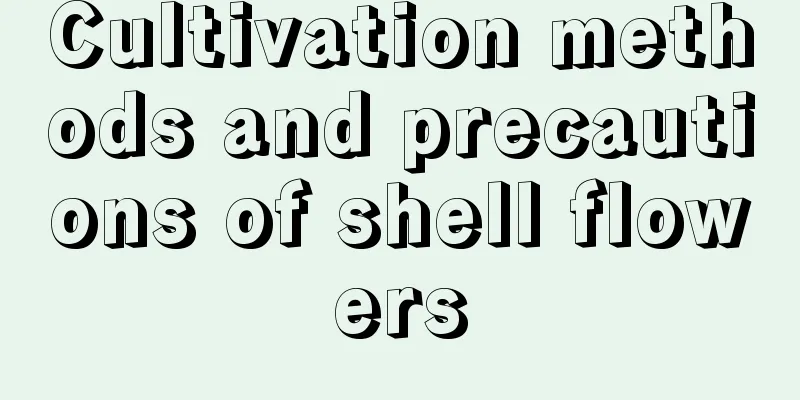Cultivation methods and precautions of shell flowers

How to grow shell flowerPot soil selectionWhen growing shell flowers, you need to decide the size of the flowerpot based on the condition of the plant. Generally, you can plant 10 to 15 seeds in a flowerpot with a diameter of 15 cm. The soil needs to be fertile and well-drained potting soil, not too sticky, otherwise it will affect the growth of the plant. Just choose garden soil with good drainage. Light and temperatureShell flowers like sunlight and prefer a warm living environment. During the maintenance process, sufficient light needs to be maintained, but avoid exposure to the sun in summer to avoid burns. The suitable temperature for growth is 15℃-30℃. Watering and fertilizingShell flowers require reasonable operations in terms of water and fertilizer management. Water frequently during the seed germination period, and after the seedlings grow out and survive, water and fertilize normally. Watering depends on the water shortage of the shell flower. If the soil is moist, there is no need to water it, but when you do, water it thoroughly. Fertilization can be applied once or twice a month, and stop fertilizing after flowering. Reproduction methodThe propagation of shell flowers is mostly carried out by sowing, which can be done in spring, summer and autumn. Ensure suitable temperature and germination will be faster. It can be transplanted when it grows 6 leaves. It is best to transplant with soil. In order to obtain good ornamental effects, it can be planted in batches. Precautions for the cultivation of shell flowersToppingShell flowers need to be pinched during their growth process in order to have more branches and shape them into a certain shape. Pests and diseasesShell peanuts are relatively hardy and have relatively few diseases and pests, but sometimes they may be harmed by leaf miners. It is necessary to observe the growth of the plants regularly, detect diseases in time, and take preventive and control measures. |
<<: Cultivation methods and precautions of Camellia Impatiens
>>: Sage cultivation methods and precautions
Recommend
Cultivation methods and precautions of Hibiscus chrysanthemum
1. Soil When breeding, the soil must be breathabl...
Tips for making violets bloom all year round
How to make violets bloom in all seasons Choose d...
When to plant zucchini
1. Sowing time Zucchini is a vegetable that likes...
What to do if the mimosa withers
Reducing the sources of mimosa wilting When growi...
Cultivation methods and precautions of wolfberry bonsai
Wolfberry bonsai is a hardy and easy-to-grow flow...
Formula of special insecticide for thrips
Piercing-sucking pests such as aphids, whiteflies...
What to do if the leaves of Impatiens balsamina wilt
1. Proper watering Reason: Do not water Impatiens...
How to grow Prodigy succulent
1. Rizhao Generally, it grows best in spring and ...
Why does asparagus fern grow vines?
1. Reasons for long vines It is a vine plant. Aft...
Bougainvillea snow purple flower
Bougainvillea Snow Purple is a purple and white v...
What are the cultivation methods and precautions of Mandarin Duck Jasmine?
Growth habits of jasmine Mandarin duck jasmine is...
Star anise seed germination method and steps How to grow star anise seeds
Star anise seeds are oily and have thick seed coa...
What are the benefits of raising a fortune tree?
1. Benefits of Feng Shui The name of the money tr...
How to prepare succulent soil? How to prepare succulent soil
Succulent soil preparation requirements Succulent...
How many years does it take for olives to bear fruit?
Olive planting results after several years Olives...









